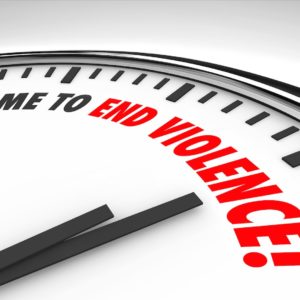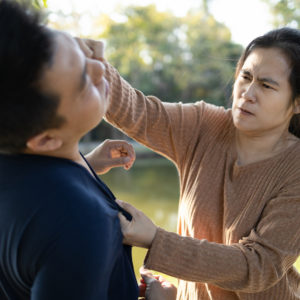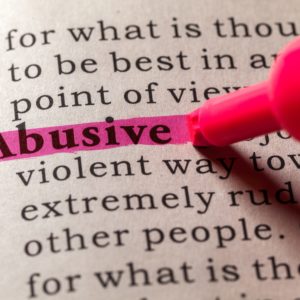 I receive frantic calls and emails each week from Christian women (and some men) who feel scared. They feel trapped, hopeless and helpless because their most intimate relationship is abusive. They are suffering from abuse verbally, physically, economically, sexually, spiritually or all of the above. The Bible has something to say about the way we treat people. And as Christians we should all strive to be Biblically wise in how we handle these difficult and painful family issues. Below are five Biblical principles that will guide your thinking about this topic of abusive relationships.
I receive frantic calls and emails each week from Christian women (and some men) who feel scared. They feel trapped, hopeless and helpless because their most intimate relationship is abusive. They are suffering from abuse verbally, physically, economically, sexually, spiritually or all of the above. The Bible has something to say about the way we treat people. And as Christians we should all strive to be Biblically wise in how we handle these difficult and painful family issues. Below are five Biblical principles that will guide your thinking about this topic of abusive relationships.
Biblical Principles on Abusive Relationships
1. Abuse is always sin.
The scriptures are clear. Abuse of authority or power (even legitimate God given authority) is always sin. Abusive speech and/or behavior is never an acceptable way to communicate with someone. (See: Malachi 2:16-17; Psalm 11:5; and Colossians 3:8,19.)
2. Abuse is never an appropriate response to being provoked.
In working with abusive individuals they often blame the other person. This can be especially tricky when trying to counsel couples. There is no perfect person and victims of abuse aren’t sinless. However, we must be very clear minded that abusive behavior and/or speech is never justified. It’s not even justified when provoked. People provoke us all the time. But we are still responsible for our response. (See: Ephesians 4:26; and Luke 6:45.)
3. Biblical headship does not entitle a husband to get his own way.
It doesn’t entitle him to make all the family decisions, or to remove his wife’s right to choose. At the heart of most domestic abuse is the sinful use of power to gain control over another individual. Biblical headship is described as sacrificial servanthood. It is not unlimited authority and/or power (Mark 10:42-45).
Let’s not confuse terms. When a husband demands his own way or tries to dominate his wife, it’s not called biblical headship. It is called selfishness and abuse of power. (See, for example, Deuteronomy 13; Jeremiah 23:1-4; and Ezekiel 34:2-4. There you will read of God’s rebuke of the leaders of Israel. He rebuked them for their self-centered and abusive shepherding of God’s flock.)
4. Unrepentant sin always damages relationships and sometimes people.
Sin separates us from God (Isaiah 59:2-5). Sin also separates us from one another (Proverbs 17:9). It is unrealistic and unbiblical to believe that you can continue healthy fellowship with someone who repeatedly sins against you. This is especially true when there is no repentance and no change. We are impacted in every way. (Read Proverbs 1:15; 14:7; 21:28; 22:24; and 1 Corinthians 15:33.)
5. God’s purpose is to deliver the abused.
We are to be champions of the oppressed and abused. God hates the abuse of power and the sin of injustice. (See: Psalm 5,7,10,140; 2 Corinthians 11:20; and Acts 14:5-6.)
What’s next, concerning abusive relationships?
How should we respond when we know abuse is happening to someone?
We must never close our eyes to the sin of injustice or the abuse of power, whether it is in a home, a church, a work setting or a community or country (Micah 6:8). The apostle Paul encountered some spiritually abusive leaders. But he did not put up with it (2 Corinthians 11:20). Please don’t be passive when you encounter abuse.
However, because we too are sinners we are all tempted to react to abusive behavior with a sinful response of our own. The apostle Paul cautions us not to be overcome with evil, but to overcome evil with good (Romans 12:21).
Biblical Guidelines to Abusive Relationships
Below are five (5) biblical guidelines that will help you respond to the evil of abuse with good.
1. It is good to protect yourself from violent people.
David fled King Saul when he was violent toward him. The angel of the Lord warned Joseph to flee to Egypt with Jesus because Herod was trying to kill him. Paul escaped from those who sought to stone him.
We must help people to get safe and stay safe when they are in abusive relationships. This is not only good for her and her children, it is good for her abusive partner. [The same is true if it is a man who is being abused.] If you are not experienced in developing a safety plan and assessing for lethality (often spouses are more at risk when they leave an abusive partner), refer or consult with someone who is knowledgeable in this area (Proverbs 27:12).
[Also note: We have several articles you can glean through that are posted in the Abuse in Marriage topic that could be helpful.]
2. It is good to expose the abuser.
Secrets are deadly, especially when there is abuse in a home. Bringing the deeds of darkness to light is the only way to get help for both the victim and the abuser. If you are working with a couple and notice that the woman defers to her husband, regularly looks to him before she answers, blames herself for all their conflicts, speak with them separately. (See Proverbs 29:1; Galatians 6:1; and James 5:19-20.)
If you are a victim of an abusive relationship, it is not sinful to tell. It is good to expose the hidden deeds of darkness (Ephesians 5:11). Biblical love is always action directed towards the best interest of the beloved. This is true even when it is difficult or involves sacrifice. (Read 1 Thessalonians 5:14; and Hebrews 3:13.)
3. It is good not to allow someone to continue to sin against you.
It is not only good for the abused person to stop being a victim, it is good for the abuser to stop being a victimizer. There is no doubt that it is it is in the abuser’s best interests to repent and to change. (See: Matthew 18:15-17; and James 5:19-20.)
4. It is good to stop enabling and to let the violent person experience the consequences of his/her sinful behavior.
One of life’s greatest teachers is consequences. God says what we sow, we reap (Galatians 6:7). A person who repeatedly uses violence at home does so because he gets away with it. Don’t allow that to continue (Proverbs 19:19). God has put civil authorities in place to protect victims of abuse (Romans 13:1-5). The apostle Paul appealed to the Roman government when he was being mistreated (Acts 22:24-29). And we should encourage victims to do likewise.
5. It is good to wait and see the fruits of repentance before initiating reconciliation.
Sin damages relationships. Repeated sin separates people. Although we are called to unconditional forgiveness, the Bible does not teach unconditional relationship with everyone. Nor does it teach unconditional reconciliation with a person who continues to mistreat us.
Although Joseph forgave his brothers, he did not initiate a reconciliation of the relationships until he saw that they had a heart change. (Read Genesis 42-45.)
Biblical repentance is not simply feeling sorry (2 Corinthians 7:8-12). Repentance requires a change in direction. When we put pressure someone to reconcile a marital relationship with an abusive partner before they have seen some significant change in behavior and attitude we can put them in harm’s way. We have sometimes valued the sanctity of marriage over the emotional, physical, and spiritual safety of the individuals in it.
The apostle Paul encourages us to distance ourselves from other believers who are sinning and refuse correction. (See 1 Corinthians 5:9-11; and 2 Thessalonians 3:6,14-15.)
A person cannot discern whether a heart change has taken place without adequate time. Words don’t demonstrate repentance; but changed behaviors over time does. (Read Matthew 7:20; and 1 Corinthians 4:20.)
Christian’s Responsibility Towards Abusive Relationships
As Christian we have the mandate and the responsibility to be champions of peace. Dr. Martin Luther King said, “In the end what hurt the most was not the words of our enemies but the silence of our friends.”
In honor of victims of domestic abuse who need wise help, please forward this article to other Christian leaders who may need to learn how to see domestic abuse through the lens of the Scriptures.
Leslie Vernick is the author of this article and graciously gave us permission to post it on this web site. Leslie is a popular speaker, author, and licensed clinical social worker and relationship coach. She is the author of seven books, including the best selling, The Emotionally Destructive Relationship and her most recent The Emotionally Destructive Marriage.
Leslie has been a featured guest on Focus on the Family Radio, Family Life Today with Dennis Rainey, Moody Mid-Day Connection. She also writes a regular column for WHOA Women’s Magazine. Internationally, she’s spoken in Canada, Romania, Russia, Hungary, the Philippines, British Virgin Islands and Iraq. She’s been married to Howard for 38 years. Together they have two grown children and three grandchildren. You can find out more about abusive relationships by going to her web site at Leslievernick.com.
More from Marriage Missions
Filed under: Abuse in Marriage







Love, love, love this article. As a Christian and a therapist, I have (unfortunately) seen many well-meaning Christians give (literally) dangerous advice when it comes to abusive relationships that don’t line up with what counseling/psychology knows to be true. This article does a fantastic job of providing biblical support for steps we often teach in counseling for staying safe physically/emotionally. I am bookmarking this article for future reference. Thank you so much for this wonderful resource.
Thank you for your supportive comment. We truly appreciate it! So many people go by their gut reactions when they try to advise people. They mean well. But when it comes to abuse issues this can get dangerous. And each situation is different so those who try to give advice need to be careful.
Yes, we care. And yes, we want them to be safe. These types of situations tug at our heartstrings. But these are not “one-size fits all” types of situations. The abuse victim needs to know that. That’s especially true as it pertains to different cultures in different countries. They need to be very careful and prayerful and come up with the best plan to be safe as they possibly can. Thank you for affirming this. We pray that every person who reads this article is able to tailor their “plan” to find places of safety that will somehow work for them!
Domestic Violence is RAMPANT in the church. The spirit of abuse (power and control), is not only in domestic violence, it is in any church where members/ pastors etc., use God to gain control over what they want. They use it to get their needs met. This generational curse needs to be broken! The spirit of abuse needs to be recognized, identified and dealt with as God says. It has been swept under the rug and ignored for long enough! Victims/survivors need to know what God says about abuse and abusers need to have consequences. Church members need to know what God says about abuse and how he says to deal with it!
Couldn’t agree more! Amen!!!
Is there another blog post by this author about emotional abuse, narcissistic abuse, and manipulation? I would be really interested to hear her thoughts on that. If not Leslie Vernick I would also be interested in hearing from someone else.
Many years ago, my mother went to our pastor to get advice on how to handle emotional abuse from my dad. He disbelieved her and (in a nutshell) told her to go home and be a good little wife. Thankfully, she later got some good advice from a different pastor and long time family friend. It’s so sad to see serious things like this get swept under the rug. My heart aches for others who have gone through the same things and worse.
Yes! You are so right that too many people sweep this under the rug. It needs to be exposed to the Light. You can read more from Leslie Vernick at her web site at: https://leslievernick.com. She has a great ministry as she tries to help the abused become more enlightened and empowered with God’s leading. Hope you find this helpful.
I think this article addresses all of these: emotional abuse, narcissistic abuse, and manipulation. Abuse is abuse. Gaslighting and other forms of verbal and emotional abuse are just as damaging as physical abuse. When an abuser can get you to stop trusting yourself, to stop believing reality when it is right there in your face, the psychological damage can take a lifetime to heal. This kind of abuse robs the person of their identity and sense of self from the inside out. Abuse is abuse and the advice given in this article works for psychological violence as well. Just my 2 cents.
Thank you Hope for sharing what you did on this issue. We have no doubt that this will help many who read it, including Emily.
Please understand that advised to leave is I’m sure well intended, but once the victim does, law enforcement rarely protects as promised. Court enforcement is very expensive and typically unavailable (please don’t depend on legal aid as they often turn domestic violence away as too complicated), and having already lost so much, desperate to merely not sink any lower, I went to a shelter where I couldn’t take my adult autistic son. Was hopeful for housing help.
I have panic attacks at night, often late, late night, requiring distraction from TV etc and often medications. Begging access to my medicine at 2am from a child younger than the one I was there trying to better provide for and told no. No meds. No TV. No lights on. No. Too often desperate for a simple foot up to allow execution of plans already in place.
Ex: you can use crime victims assistance to relocate. Your child’s SSI payments were redirected by abuser so you need to redirect back to you. Child support payments that are ordered have been unpaid and are under assessed. You can be paid for caring for your disabled child. Housing vouchers. Etc. All of this equals a doable existence to heal and get a plan. One thing… What do you do while waiting for the victim’s assistance? Where do you go?
You are great with money; the problem is he never lets you touch it. Not a penny in your purse. No vehicle you can leave in. The work truck never has fuel and he hides the keys. Denied glasses or contacts. Can’t see to drive and honestly walking distances is troublesome and can’t see to navigate public transportation. If you left while he was gone, where are you going to go? Friends will tell him. They are his friends, not yours. He took your id, lost it, and you’ve never been allowed to get around to replace it. No credit. No job. Can’t work and leave disabled son alone. Son eats limited specific diet. So far son always gets to eat. Leave and chance that being impossible?
Very quickly a smart educated, competent woman becomes ill from stress, fearful for child, making decisions to survive today knowing that tomorrow is unknown.
It’s not as simple as it appears on the surface.
I totally agree with your comment and can relate. I just wanted to post that you are not alone and that often times well intentioned organizations and ministries are not suited for the covert/hidden abuse tactics. The system overall seems to be designed to help those in obvious physical distress. Unfortunately physical abuse is not the only abuse form and there needs to be more awareness and support for those in various destructive situations.
I’m still trying to break out due to various complications and the only thing I can share is continue to seek the Holy Spirit for wisdom, direction, and strategies to break out. I’m praying for you and your son.
I just found your website & I’ve looked for years. This one’s the better out of all the best websites I have come across. There are so many good ones out there, not to discredit them, however, I think this one is my favorite. THANK YOU SO MUCH FOR BEING OBEDIENT AND FOLLOWING GOD’S CALL ON YOUR LIFE AND WRITING THIS ARTICLE FOR ALL TO BENEFIT FROM!
One, it is very simple to read; it explains so much and it answered a lot of questions that were posing serious issues and problems upon me (the victim, which I don’t ever claim to be! I’m a survivor), in the sense of how I was being treated during the time I was going through domestic violence myself with my husband; even, in and from the church, which I was so shocked about. I can’t tell you how thankful I am for this website and for reading your article, and how thankful I am that you do have something like this to help those in need including myself! I also want to thank you for the information you gave on reading every comment!😊 I am so thrilled to hear that. It gives those of us who have been abused a safe place to go without worry or concern of outside influences, possibly, doing more harm with their written words, to those who have been and are, in those hurtful and dangerous situations.
Others who have also been abused, may agree with me when I say, we want to diminish the problems and go through them with Jesus not add to them and accumulate more heartache. Those of us who may have been violently abused in so many different ways, need safe places to go to use their voice and speak openly and freely with constructive criticism, and needs a safe support system out there whether it be text, email, on the web, social media, as well as in person! It actually helps to build some of us who may be in a place that was so demeaning to our very existence that now we have to take the time to build courage and encourage one another to stand and share in our stories and give informed advice and directions as to what to do and stand together in this fight not only for the abused but also for abusers for the sake of our future – our children!
Though, abusers have to realize that what they’re doing and come through it hopefully towards God not more violently, only then can we hopefully fight all of this together one day! The real enemy is Satan himself deceiving others. He comes to divide, conquer, steal, kill and destroy, and he deceives all, the abuser (as well as the abused at times).
However, with that said, there are those in certain positions whether it be in the home as a husband of the head of the home, or the church whether it’s pastors, deacons or even other women in the church, not just the world unfortunately, who criticize those abused women, children, and even some men, through judging us, saying harsh words and accusations, or tell us to get over it and forget it. They say we should forgive, move on, and forget it, or to relax and be better in the bedroom for our husband’s! Those are lies from the pit! And they need to realize what they’re saying and what they’re doing is more damaging, does more harm to the abused and gives more power to the abuser, or abusers in some cases. By all means we need to forgive our abuser and pray for them but like you said earlier in your article we need to be safe!
Everyone deserves to have a safe place to be safe to express our hearts, minds and spirits for the glory of God. However, there is a price to follow Christ it’s not going to be always easy and yes some of us are going to get ridiculed and abused verbally and possibly even physically only because we follow Christ. But that does not mean that we stand there and allow them to go ahead and use those positions of power for abuse, like you stated. It doesn’t mean we stand there and keep our mouths shut and push it under the rug because that’s what they’ve tried to train us to do. No, Jesus rebuked the Pharisees in the Bible and God says no to cruelty! Per your article.
We should all say no to it. God says Yes to something we should all say Yes to His something, if He says No, we should say No. We as Christians have an obligation to keep all Biblical scriptures, without taking the scriptures out of contents and interpret it correctly, to use like 2 Timothy 3:16 – 17 which says, “All Scripture is given by inspiration of God, and is profitable for doctrine, for reproof, for correction, for instruction in righteousness, that the man of God may be complete, thoroughly equipped for every good work” (2 Timothy 3:16-17), so, to correct, teach, rebuke, or show by our words and in our example in how we live, react and respond in life, so the world may see and know of God’s word that He may be glorified to others; as, you have shown in your article. Thank you so much for blessing me, and I’m sure you have blessed others with it, and probably constructively confronted those who abuse as well. I can only pray for all of our sakes.
You exactly pinpointed the problems and the issues in and out of the church, home, and world to those who are being abused, to those who are abusers and to those who are standing around not knowing what to do, maybe because they simply don’t know what to do, either because they have not been trained in this matter never experienced this matter or, they themselves are abusers and totally against obeying God.
Whatever the reason, I thank you so much for this website and your article, it was very precise, to the point, very clear, informative, giving guidance, strength and encouragement to those abused who needed it, as well as rebuking, correcting, and teaching to abusers who also needed it. I will definitely be researching more of your articles and hope you continue in the fight for freedom for all and encouraging unity in Christ for others, rather they are abused or abusers, to free the abuser from their delusional deceptions and destructive violence, as well as, to free the abused from misguided misconceptions, ill-incorrect instructions, and especially freed from the grips of mental, emotional, sexual, spiritual, financial, verbal, physical violent oppression forced and brainwashed upon us to accept and just take it, and give the abused a Safe Haven under the wing of God.
I thank you and I pray and encourage you and ask the Lord to continue to bless this ministry of His through you, that you have right now. It has been my prayer for years that, for either God to use me or someone else out there to help others in promoting the right and more importantly, Biblical way of thinking towards healthy relationships, so that us abused won’t become abusers ourselves, as well as those who are abusing won’t continue becoming more dangerous. But will STOP the Violence! I hate that saying when others, especially in the church say, “Hurting people hurt people!” No that’s not necessarily true. Evil people hurt people! And hurt people want to be helped, to get help and want to be healed, safe and free!
I believe that in my heart and some of us have been very unfortunate not to receive the correct help either because they themselves are abusers or they just don’t know and they don’t know how even with the little bit of information that we do have about domestic violence out there, how to help. Though, there is so much information in the Bible that God gives us: His directions, guidance and instructions are clear, precise and safe for all to follow. His Love, strength and protection is pure, honest, and healthy for all to receive. His Rules, Laws and Commands are for all to obey. And most importantly, safe, for all of us, if only we would listen, take hold of them, and do them – living them out in our lives in obedience.
Thank you so much again I will be looking forward to more of your articles and ask God to bless, protect, and guide you with this wonderful, adventurous journey in this ministry! WE ALL NEED AND APPRECIATE THIS SO VERY MUCH! 💖
Please how do I cope in a marriage where my wife is verbally abusive when there is a misunderstanding and often times threatens to beat me especially when there is an argument and I persist in having it my way? She is unforgiving because she keeps records of all my wrongs; she is also very bitter. Even after all these abusive episodes, I go up to her to apologize and she never, ever apologizes to me for the hurtful things she has said to me. She is extremely sensitive.
I need help but no one to talk to without her getting involved. As soon as she knows that I have spoken to someone, she goes about giving me grief.
My son has physically abused my daughter-in-law and now he’s emotionally and verbally abusing her. She has a child by him and she has two children from a relationship before. I want to protect her and I’m trying my best but my mother-in-law says I cannot protect her. I’m just to stay out of it. What do I do? I have prayed, I have talked to her, I listen to her, but she’s devastated. She’s crying, she’s suffering from depression, her children are suffering because of this, and her baby, which is my son’s is going to grow up in this and she doesn’t want that. Is it wrong for her to want out of this relationship? They have been married two and a half years. It’ll be 3 years in December.
Karen, I recommend you visit Leslie Vernick’s web site. The link is given at the bottom of the above article. Leslie works with abusive relationship issues and is also a Christian. Please go to her web site and see if your questions are answered there.
There’s no doubt that your daughter-in-law should not just put up with abusive behavior. She needs to find ways to escape the abuse. Please go to Leslie’s web site and see what you can learn there.
I can’t find anywhere in the scriptures where women or men are told it’s ok to leave an abusive spouse. I wish there was. The scriptures used unfortunately, were ones taken completely out of context.
I am a Christian who has been with the same man for 14 yrs before we married. We have been married 1 1/2 yrs. My husband was not a Christian prior to marriage and I expressed I would not marry unless he came to know Christ. One Sunday he said he accepted Christ and 6 mos later we married. Just a few months later, it became verbally abusive. Behind closed doors he was a monster.
I prayed and prayed. He was addicted to Porn and saw a face that looked like me. He wants admittance to what I never did and intimacy has stopped because I was treated as such. I even went as far as taking a lie detector test and passed. He accused me of paying off the tester. I pray to God, hoping God would show him truth, but now I am in fear and don’t sleep because he keeps me up calling me a liar.
I have really tried and have kept this to myself except for two people at church. I don’t want him to perish, but I can only hold my tongue for so long before I sin with words to protect myself. I am so hurt as I waited so long to make sure this marriage was right. I found out he constantly cheated and feel his accusations are to take the focus of himself. Please help.
Hello. Hypothetical question: if a woman leaves her abusive spouse, is she able to re-marry?
There are Bible scholars who hold positions on both sides on this issue. What is God telling you as you read His word?
My husband and I are separated and I filed for a divorce due to abuse throughout the 20 year marriage. He won’t sign the divorce papers unless I admit to a lie of adultery.
Do I have grounds for a divorce due to domestic violence? We live 400 miles apart and I am not ready nor healed yet for any type of reconciliation. Victoria A.
Victoria, I’m so very sorry that you are going through this in your marriage. This is a horrible situation to live through and try to come to a place of healing. My heart truly cries for yours.
As much as I want to help answer your question about “divorce due to domestic violence” I have to confess that I have not personally studied that particular aspect of the Bible. Instead, I encourage you to go back to the bottom of this article, which was written by Leslie Vernick and go into the link to her web site. Leslie HAS studied the Bible as far as what the Bible says about domestic violence and also divorce that happens as a result of such trauma. She could better help you in your healing process. She has a lot of Christian based, ongoing videos, interactive Facebook presentations, coaching possibilities, and an ever growing number of resources she features and offers for those who are seeking healing, clarifying insights, and help. I am quite certain that you would be enlightened in many ways and would have many of your questions answered.
I hope this will help. The trauma you have gone through and are now going through has got to be horrible. I truly hope you can find the help you are seeking, starting with Leslie’s ministry. Please know that my prayers are with you. We are told in the Bible, “Even in the darkness light dawns for the upright…” (Psalm 112:4) I pray you sense God’s presence with you, guiding you and piercing the darkness. May His light shine upon you as you lean into Him!
I am divorcing my mental/emotional abusive husband. And God hates divorce! I absolutely hate the circumstances I am in. I know God will forgive for this… but what if years down the road I want to remarry? Doesn’t that make me an adulteress? And that is also a sin. Could I get some advice on all this please?
Hi Sherry, I’m so sorry that you find yourself in this place where divorce seems like the only way out. And I sure understand how you could hate this circumstance. Your husband should never put you in this place. You are his bride, and he should treat you as such. Please know that my heart goes out to you.
As far as divorcing and remarrying, I really cannot tell you what to do about that. Divorce and remarriage is a personal thing between the person and God. No person can give you their stamp of approval on either. They can tell you what they believe God has told them personally about this as they study God’s word (or they will tell you what their own heart says about this, which can be problematic because their emotions can be involved) but only God can tell you this. You can look at Leslie Vernick’s website (Leslie is the author of this article and we provide a link below this article to her web site) to see what she has found in all of her biblical research concerning this matter. We have a lot of respect for Leslie.
But after reading what she says, even so, you really need to approach God on this on a personal level and see what you believe God is telling YOU through His word and in prayer. I wish I could help you more than this. It’s in my heart to do so. I’m truly not trying to be evasive, but Steve and I believe that God is telling us to let Him do the talking to individuals on this matter–not us.
I/we sincerely pray that you will find the answer you are seeking. We are “asking God to fill you with the knowledge of His will through all spiritual wisdom and understanding. And we pray this in order that you may live a life worthy of the Lord and may please Him in every way: bearing fruit in every good work, growing in the knowledge of God.” (Colossians 1:9-10)
Is it okay to be told to Shut up by your husband? Is it okay when you do voice your feelings or opinion to be told one speaks rubbish? Is it okay to be told one is not a good Christian?